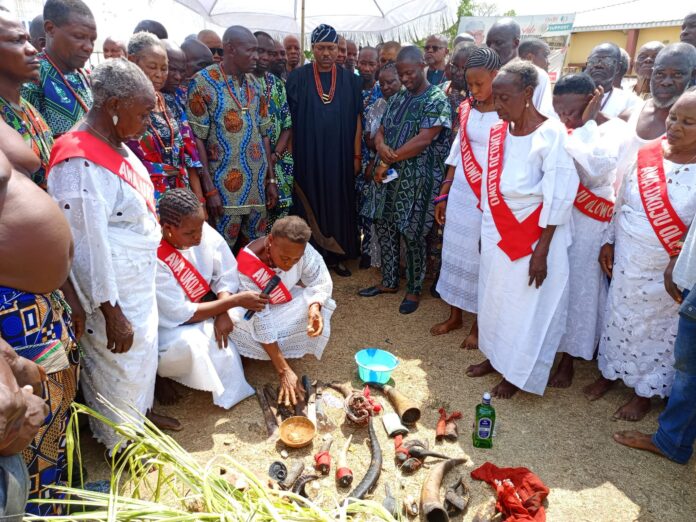In a powerful and dramatic response to the increasing cult-related violence that has rocked Owo, Ondo State, the Olowo of Owo, Oba Ajibade Gbadegesin Ogunoye III, has issued a curse on cultists and their sponsors. The monarch’s move follows a disturbing rise in killings linked to cult activities that have gripped the region, causing widespread fear and anguish among the local populace.
The curse, which was delivered during a solemn ceremony at the Ogwata Square in Owo, marks a major turning point in the battle against cultism that has plagued Ondo State for years. The Oba, who was joined by traditional leaders, spiritual groups, and prominent figures from the community, sought the intervention of ancient deities to bring swift justice on those responsible for the violence, while asking for divine blessings to restore peace to the kingdom.
The recent killings, which have left several individuals dead, have sparked intense debate about the role of politicians in fueling the violence. According to stakeholders in the community, politicians are often accused of sponsoring and enabling youth involvement in cult groups for political gain. Among the victims of the recent attacks were Fisayo Oladipo, an APC chieftain, and the wife and child of Alhaji Abdulkareem Adedokun, a respected Muslim cleric in the area. These deaths have prompted heightened concerns about the growing threat of cultism in Owo and the surrounding areas.
Oba Ogunoye, who has long been a vocal advocate for peace and security in his kingdom, did not mince words during the ceremony, condemning the ongoing violence and the individuals behind it. “We will not allow our land to be desecrated by the blood of our innocent people. Let this curse be a warning to the cultists and their sponsors—there will be no peace for you until justice is served,” the monarch declared.
The event also saw the participation of various traditional and spiritual leaders, who performed rituals invoking the blessings of the gods to protect the kingdom and its people. The ancient deities, according to Owo’s cultural beliefs, were called upon to deal with the cultists and their backers, ensuring that their activities would no longer go unpunished.
Politicians Blamed for Fueling Cultism
The curse placed by Oba Ogunoye comes amidst growing accusations that politicians have been complicit in the rise of cultism, often using these groups as tools to secure their political interests. These allegations were echoed by the Police Area Commander for Owo, Mr. Adenike Peter, during a meeting with the Owo Youths Forum.
Peter, while addressing the forum, called on politicians and influential individuals to stop interfering with police operations, particularly when cult suspects are apprehended. “Politicians must stop pressuring the police to release cultists who are arrested. This interference is a major hindrance to our efforts to combat this menace,” he said.
The police commander’s statement has ignited further conversation about the role of local political figures in perpetuating lawlessness in the region. His words were directed at those who, according to the police, use their influence to shield cult members from the long arm of the law, thus emboldening them to continue their violent activities.
Peter also urged the public to play a more active role in addressing the issue, stressing the importance of community cooperation in curbing the spread of cultism. “Parents must take responsibility for their children and report any suspicious activity to the police. These criminals live among us, and we need the community to be vigilant in helping us root them out,” he implored.
Youth Exploitation and Abandonment
A central theme of the discussions in Owo has been the exploitation of idle youths by political actors. Comrade Damilare Aina, the coordinator of the Owo Youths Forum, emphasized the need for politicians to take responsibility for the way they use young people for political purposes. “Politicians exploit the youths for their own personal gain, but once the elections are over, these youths are abandoned to fend for themselves. This abandonment is a major factor driving many of them into cultism,” Aina explained.
Aina’s comments highlight a growing concern among Owo residents about the vulnerability of young people, particularly those who are unemployed and looking for a sense of belonging or financial gain. With limited opportunities and little guidance, many of these youths are drawn into the world of cultism, where they find both camaraderie and financial incentives from unscrupulous sponsors.
In a bid to restore peace, Aina emphasized the importance of addressing the root causes of youth involvement in criminal activities. “We need to create opportunities for our youths—employment, education, and guidance. Without these, the cycle of violence will continue, and we will never see the peace we all crave,” he concluded.
Government Responds to the Crisis
As the violence continues to escalate, government officials have begun to take more public actions to address the situation. Ondo State’s Deputy Governor, Olayide Adelami, has joined in the call for the public to cooperate with security agencies. Represented by his Chief of Staff, Dr. Kola Falohun, Adelami urged residents to report any cult-related activities they observe. He warned that the ongoing killings, if left unchecked, could severely damage the reputation of the community.
“These killings not only threaten our security but also risk bringing disrepute to the good name of Owo,” Adelami stated. He also highlighted unemployment as a critical factor that exacerbates the situation, making it easier for politicians and criminal groups to recruit vulnerable youths into their ranks. “We need to address the root causes—unemployment and lack of opportunity—for this cycle of violence to end,” he said.
The Deputy Governor’s remarks echo a growing consensus in Owo that joblessness, lack of education, and poverty are some of the key drivers of the rise in cultism. It is clear that without addressing these structural issues, efforts to curb the violence may not be sustainable in the long run.

